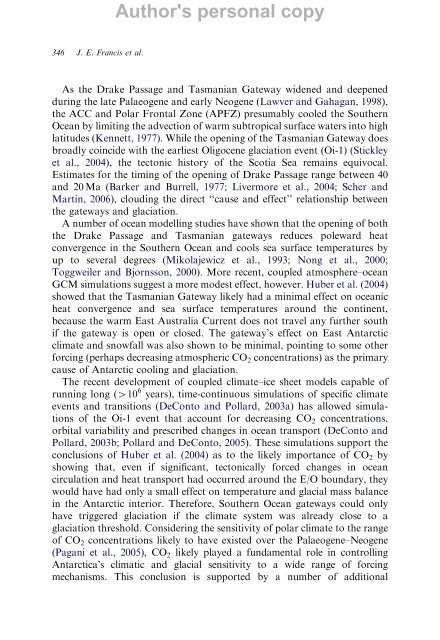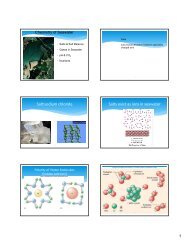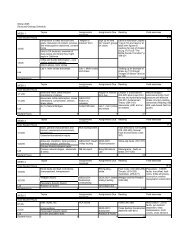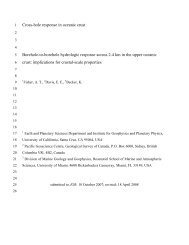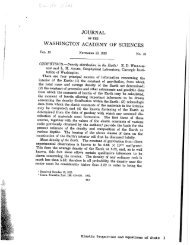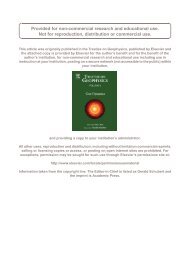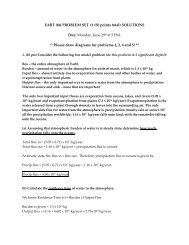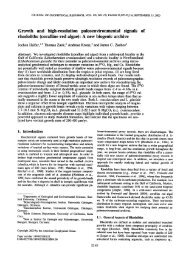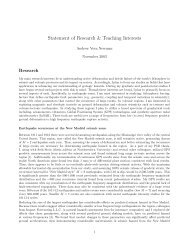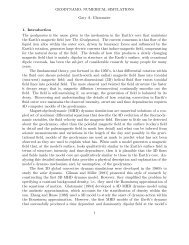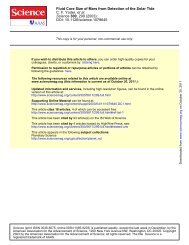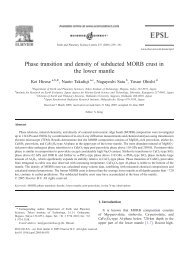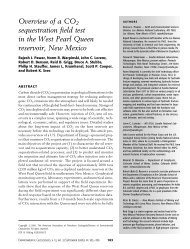From Greenhouse to Icehouse – The Eocene/Oligocene - UMass ...
From Greenhouse to Icehouse – The Eocene/Oligocene - UMass ...
From Greenhouse to Icehouse – The Eocene/Oligocene - UMass ...
Create successful ePaper yourself
Turn your PDF publications into a flip-book with our unique Google optimized e-Paper software.
346 J. E. Francis et al.<br />
Author's personal copy<br />
As the Drake Passage and Tasmanian Gateway widened and deepened<br />
during the late Palaeogene and early Neogene (Lawver and Gahagan, 1998),<br />
the ACC and Polar Frontal Zone (APFZ) presumably cooled the Southern<br />
Ocean by limiting the advection of warm subtropical surface waters in<strong>to</strong> high<br />
latitudes (Kennett, 1977). While the opening of the Tasmanian Gateway does<br />
broadly coincide with the earliest <strong>Oligocene</strong> glaciation event (Oi-1) (Stickley<br />
et al., 2004), the tec<strong>to</strong>nic his<strong>to</strong>ry of the Scotia Sea remains equivocal.<br />
Estimates for the timing of the opening of Drake Passage range between 40<br />
and 20 Ma (Barker and Burrell, 1977; Livermore et al., 2004; Scher and<br />
Martin, 2006), clouding the direct ‘‘cause and effect’’ relationship between<br />
the gateways and glaciation.<br />
A number of ocean modelling studies have shown that the opening of both<br />
the Drake Passage and Tasmanian gateways reduces poleward heat<br />
convergence in the Southern Ocean and cools sea surface temperatures by<br />
up <strong>to</strong> several degrees (Mikolajewicz et al., 1993; Nong et al., 2000;<br />
Toggweiler and Bjornsson, 2000). More recent, coupled atmosphere<strong>–</strong>ocean<br />
GCM simulations suggest a more modest effect, however. Huber et al. (2004)<br />
showed that the Tasmanian Gateway likely had a minimal effect on oceanic<br />
heat convergence and sea surface temperatures around the continent,<br />
because the warm East Australia Current does not travel any further south<br />
if the gateway is open or closed. <strong>The</strong> gateway’s effect on East Antarctic<br />
climate and snowfall was also shown <strong>to</strong> be minimal, pointing <strong>to</strong> some other<br />
forcing (perhaps decreasing atmospheric CO 2 concentrations) as the primary<br />
cause of Antarctic cooling and glaciation.<br />
<strong>The</strong> recent development of coupled climate<strong>–</strong>ice sheet models capable of<br />
running long (W10 6 years), time-continuous simulations of specific climate<br />
events and transitions (DeCon<strong>to</strong> and Pollard, 2003a) has allowed simulations<br />
of the Oi-1 event that account for decreasing CO 2 concentrations,<br />
orbital variability and prescribed changes in ocean transport (DeCon<strong>to</strong> and<br />
Pollard, 2003b; Pollard and DeCon<strong>to</strong>, 2005). <strong>The</strong>se simulations support the<br />
conclusions of Huber et al. (2004) as <strong>to</strong> the likely importance of CO2 by<br />
showing that, even if significant, tec<strong>to</strong>nically forced changes in ocean<br />
circulation and heat transport had occurred around the E/O boundary, they<br />
would have had only a small effect on temperature and glacial mass balance<br />
in the Antarctic interior. <strong>The</strong>refore, Southern Ocean gateways could only<br />
have triggered glaciation if the climate system was already close <strong>to</strong> a<br />
glaciation threshold. Considering the sensitivity of polar climate <strong>to</strong> the range<br />
of CO2 concentrations likely <strong>to</strong> have existed over the Palaeogene<strong>–</strong>Neogene<br />
(Pagani et al., 2005), CO 2 likely played a fundamental role in controlling<br />
Antarctica’s climatic and glacial sensitivity <strong>to</strong> a wide range of forcing<br />
mechanisms. This conclusion is supported by a number of additional


